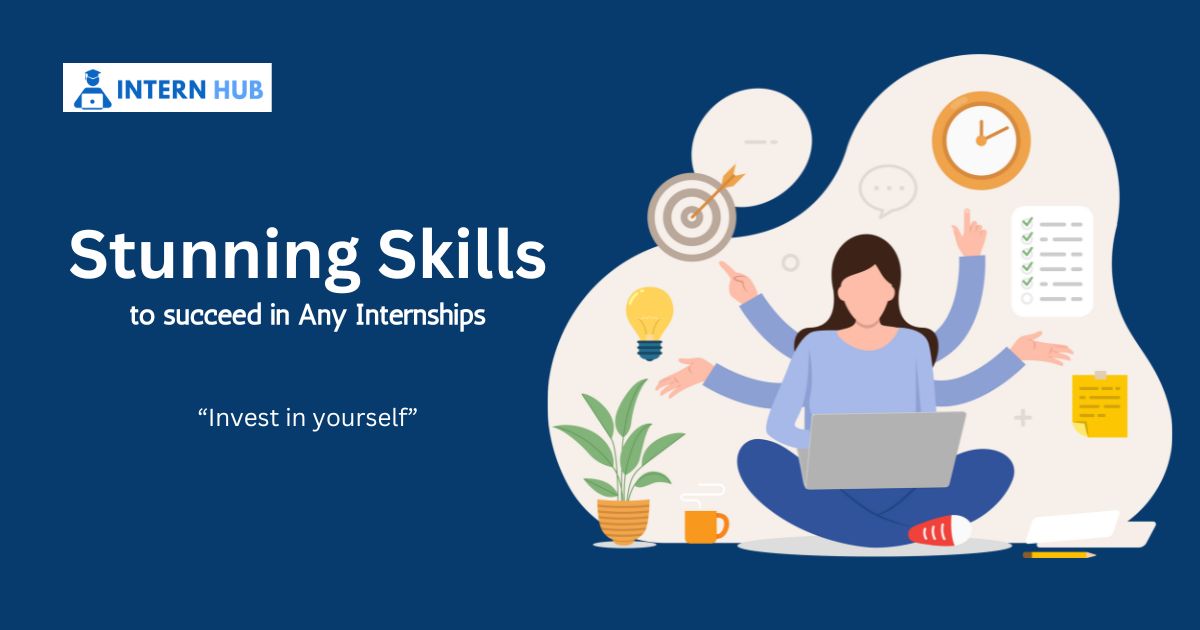
Essential Skills for Internship Success: Your Blueprint for Excelling in Any Role
An internship is an opportunity to gain work experience in a specific industry and test the various theories and concepts learnt throughout the academic journey. It also drastically increases your chances of being offered a full-time job later on.
Despite what your major/degree or preferred industry is, employers are interested in specific attributes and competencies when looking for internship or entry level applicants. Your GPA isn’t the only factor that is considered, so whether you are looking for a summer internship, planning on developing your time management skills during your academic year as a student, or applying for your first job as a graduate, here are some skills and personality traits employers look for:
-
Passion & Motivation
If you want to be successful at your job and enjoy working while moving up the career ladder, it is essential to be passionate about the work that you do. You may not know what your passion is yet, but you can be passionate about learning, a specific industry or a specific cause. Passion/drive intensifies focus toward excellence and enables creativity and innovation while creating job satisfaction & fulfilment. While employers are not expecting you to have all the answers, they are expecting you to be driven and energetically passionate about the mission they are offering you.
-
Emotional Intelligence
Regardless of the industry, you will be interacting with colleagues, clients, managers as well as other stakeholders. Your ability to relate to others, demonstrate understanding and integrity and build strong business relationships is a key component to your success and the success of the organisation. It’s essential to be the kind of person your colleagues would like to interact with every day. Therefore, employers seek individuals who can identify the different wants and needs of others and acknowledge the value of different perspectives/opinions.
-
Communication
Communication can occur in different modes, such as written and verbal. Employers are usually interested in your ability to write and speak professionally. You have the opportunity to showcase your written communication through your CV, cover letter, and your verbal skills through your thoughtful and considerate answers through the common interview questions. The ability to translate your thoughts and ideas and convey information effectively is a key in any type of field.
The ability to communicate effectively is certainly one of the most important skills interns should have, if not the top one. At any company, communication that is timely, actionable, accurate, and understood is critical for long-term success and day-to-day operations. Information is important, of course, but the way that information is conveyed makes all the difference.
Some communication skills will be tested well before you secure the internship. For example, you’ll have to showcase great written communication skills and visual presentation abilities on your job application, resume, and cover letter. At the internship interview, you’ll have the chance to wow them with your verbal communication skills and active listening. Non-verbal communication such as eye contact and body language may play a role here, as well.
Don’t let off once you land the internship position, either. To succeed as an intern and in every role you’ll have in the coming decades of your professional career your ability to communicate effectively will play a central role.
-
Adaptability
Whether you are looking to intern at a start-up or a well-established organisation, you will need to adapt to the different tasks that might be assigned to you. As an intern, it is essential for you to be adaptive to different areas of work. While you may have a particular interest in a field, a willingness to try out and become familiar with the different areas in an organisation is most definitely viewed as an important skill which can lead to increased exposure and opportunities within the company.
A workplace can be quite a fast-changing environment, and interns often feel that acutely due to constantly shifting schedules, tasks, and goals.To thrive, you’ll have to be adaptable and resilient. Adaptability is your ability to adjust based on changing circumstances, while resilience is your ability to recover from setbacks and difficulties.
Reframe negative feedback as constructive criticism. Think of setbacks and mistakes made as opportunities to learn. Try to view challenges ahead as obstacles to be overcome. Embrace change and be flexible when hardships happen along, as both are certain to happen over the course of your internship.
-
Innovation/Initiative
Employers are keen to find out what are the new ways an organisation can improve. As an intern, you can come forth and share the different ideas and tips you have to offer. This step is always appreciated by employers as they get to see how interns are interested in showing initiative for different work tasks. As an example, during your interview, you can highlight the different times where you have taken it upon yourself to showcase and contribute a positive change that had a great impact overall. Your potential employer will appreciate the opportunity of bringing in someone who has a sense of direction and initiative.
One of the many benefits interns bring to the table is creativity. In fact, many companies and teams look forward to new pools of student interns, as they’ll bring with them fresh ideas, new perspectives, and creative approaches to things that veteran employees may be blind to.
During your internship, show off your creativity by pitching ideas and suggestions, large and small. Don’t worry about creative contributions that don’t take off, as you’ll still be showcasing your initiative while simultaneously building up that all-important resilience we discussed earlier. A true win-win!
-
Critical thinking
Critical thinking indicates your ability to analyse and evaluate a certain situation or issue and form a consensus or judgement. The skill to think critically can be showcased through a willingness to explore, ask questions, and understand a problem from all different angles to come up with different creative solutions. This skill is something that many of your professors might have given importance to during your academic career, and it is highly valued by employers too.
In the workplace, critical thinking is often that which is open-minded, evidence-backed, rational, and based on analytical reasoning and reflection. As a critical thinker, you evaluate information logically, independently, and thoroughly, as opposed to rashly or based solely on intuition.
Employers place a high value on critical thinking, as it usually goes hand-in-hand with making good decisions and being well-informed. In certain industries, it’s absolutely necessary, especially those dealing with data, money, health, law, and marketing. At its finest, critical thinking prepares you to answer tough questions, equips you to back up your reasoning with proof, and shows off your ability to view issues from all perspectives.
-
Receptiveness
The ability to receive feedback positively is critical. This skill allows you to grow and improve with all the valuable suggestions you might receive from your employer. The positive action that you take up after receiving feedback creates a great impression about you to your employer. While taking initiative is essential, so is the ability to receive feedback and to use it to your own advantage by looking at the bigger picture.
Receptiveness refers to one’s ability and willingness to accept ideas, suggestions, decisions, and demands, and the ability to do so professionally. Similarly, according to Joseph Folkman, a leadership development researcher, someone who is coachable “not only responds well when given feedback, they ask for feedback. They view the input from others as a valuable tool in their development. They also are willing to take actions and make personal changes based on the feedback.”
Essentially, you’ll have to have somewhat of a thick skin. When given feedback you feel is negative, accept it gracefully rather than getting upset about it. Thank them for the learning opportunity instead of storming off with an attitude. As an intern, being coachable means having a commitment to professional development. Don’t just thank someone for instruction or feedback, but really take it to heart.
-
Technical Proficiency/ IT
You certainly won’t be an expert in every technological field but it is essential that you know your way around a computer and the basic software that is needed in everyday tasks at work. Technical proficiency is a skill that employers definitely look into.
-
Time management
During your academic career, you must have had deadlines for assignments that you had to meet, you therefore have already exhibited time management skills. But as an intern, you may not have someone to set deadlines for you. You will need to organise and plan beforehand all the work that needs to be done. You need to set your priorities and identify the deadline that needs to be met accordingly. Employers want to know if you are responsible enough to handle tasks and produce results for a particular project on time.
Planning and prioritising skills have everything to do with productivity, efficiency, impact, and organisation Your ability to plan requires time management skills, and being able to prioritise tasks goes even further, incorporating adaptability, problem-solving, decision-making, and analytical thinking.
As an intern, you may find yourself being pulled in multiple directions at once. You might be given conflicting information or instructions, or you could be given several tasks all with a high priority and due yesterday.
To avoid stress and achieve success, it is important that you are able to prioritise what’s on your plate yourself. Learn to estimate delivery times, and come up with your own personal scale of urgency and importance. Practice managing expectations early, especially when you’re certain of the impossibility. Incorporate flexibility into the mix, as you’re certain to get last-minute requests you hadn’t expected that are both incredibly urgent and of the highest importance.
-
Collaboration/Teamwork
In any organisation, teamwork is essential. You will likely be working with different team members at every level and your ability to fit in quickly and contribute will definitely be assessed by employers during the interview process. Make sure you have identified your own strengths and weaknesses so that you are clear on the contribution you can make. Similarly, be mindful of how you can bring out the best in your team.
Known in everyday conversation as “social skills” or “people skills,” interpersonal skills add up to the ability to interact with and work with others well. According to a soft skill study in the IUP journal of soft skills, great interpersonal skills are associated with both how effective the intern is and employable they might be later.
Made up of a group of skills including communication, conflict resolution, emotional intelligence, and more, interpersonal skills are highly sought-after in employees and interns. It forms the backbone of effective teamwork and collaboration, and your interpersonal skills will be measured with each and every professional interaction you take part in, from interviews to networking to leadership and beyond.
-
Organisational skills
Student interns are given a lot of tasks, goals, and information all at once and constantly during the three to six months in the position. “Organisational skills” is actually an umbrella term for a group of skills that lets you use time and resources efficiently and effectively, including time management, delegation, scheduling, and setting goals, among others.
To be successful as an intern, you’ll have to stay organised. From finance internships to political internships, keeping things straight will ensure you stay on schedule, up to date, and productive, and it will help you deliver at the highest quality. Plus, with the inevitable stress that comes with navigating a busy working environment, you’ll be better able to keep potential anxiety at bay.
-
Initiative
Initiative is one of those traits that can really set you apart from others, both now as an intern and even more so later on, as a full-fledged employee. Simply put, initiative is to take action on your own, without instruction or suggestion from your supervisor first. It’s a display of enterprise and resourcefulness that often impresses managers and coworkers alike.
Taking initiative should be done after careful consideration; otherwise, it could be seen as inappropriate, overstepping, or an example of poor judgement. However, when done right, it shows that you can think for yourself, work independently, and make decisions when needed as a surefire way to shine as a candidate, intern, or employee!
-
Ability to work independently
Though you may find yourself on a large team with dozens of stakeholders, hiring managers still prize the self-sufficiency skill in their prospective interns. Working autonomously is a great way to focus on deep work and knock out small or overdue tasks. However, it takes self-discipline, as you’ll be required to keep on top of yourself. Also, be sure to understand when to work independently and when not to — it’s better to collaborate and ask questions than to deliver work that is over budget, out of scope, or of poor quality.
The ability to work independently goes hand in hand with taking initiative, and together they show how trustworthy you can be without supervision — a prerequisite for getting more responsibilities and promotions in the future. And, if you want the company to offer you a contract when your internship comes to an end, this is definitely one of the traits they’re going to be looking for.
-
Problem solving & Decision making Skills
The problem-solving process involves identifying an issue, isolating the cause, evaluating solutions or alternatives, implementing these fixes, and later following up to ensure the problem is resolved. The decision-making process identifies one or multiple possible courses of action, gathers data and potential options, and then attempts to determine the best course forward.
The two are often grouped together, and they do share some overlapping elements. In fact, some people group problem-solving skills as a subset of decision-making skills, while others actually consider the decision-making process to fit under the problem-solving process.
The abilities to solve problems and make good decisions are important for interns, college students, and employees, as well as in regular, everyday life. As an intern, you’ll be tasked with solving multiple problems with less information at the start compared to regular employees. You’ll need to make good decisions based on sound judgement, so always be prepared to explain how you arrived at your chosen solution or course of action.
-
Self-motivation
Self-motivation is your own internal drive to accomplish your goals and tasks. While initiative plays a large role in it, self-motivation goes far beyond simply doing things without being asked. It implies a desire to achieve success and earn top results, acknowledging and delighting in the act of needing to push yourself on your own.
We all have different levels of self-motivation depending on what’s being considered. One person might be highly motivated to exercise each day after work with a personal goal of competing in a triathlon in a year’s time. Another person might have set a personal challenge to read 100 books in a year, for instance.
As an intern, it’s important to show self-motivation toward something that aligns with the company’s goals. While your passion and drive is great, your manager will particularly appreciate these characteristics when it aligns with your team objectives.
To help motivate yourself, think of your professional goals with the internship. Why are you there? What are you hoping to accomplish? Whether it’s work experience or networking opportunities or something else, use that as a North Star to help keep your eyes on the prize. When you can connect smaller, mundane responsibilities with your overall goal, you’ll be better able to sustain self-motivation as an intern!
-
Density/Determination
Tenacity is the quality of being very determined while having the persistence to get things done when necessary. As an intern, you are often simultaneously the newest team member, the lowest in rank, the youngest coworker, and “just” (in the eyes of the long-term staff) a temporary colleague. Because of these points, unfortunately, you may have to deal with being overlooked or having your ideas dismissed, among other things.
For example, while you will often work within one specific team, you may have to make the rounds through different departments to get buy-in, feedback, permissions, updates, and other things. Maybe clients, investors, readers, or end users are involved, as well, which can test even the most seasoned employee. In this case, tenacity is seeing your obligation to get the job done — and get it done right — without cutting corners or giving up early.
Tenacity shouldn’t be confused with stubbornness or being annoying, though you might think it comes off that way. Nor should determination lock you onto a path that may not make sense after new information comes to light. But, when used appropriately, tenacity and determination can certainly set you apart from other interns!
Sources:


